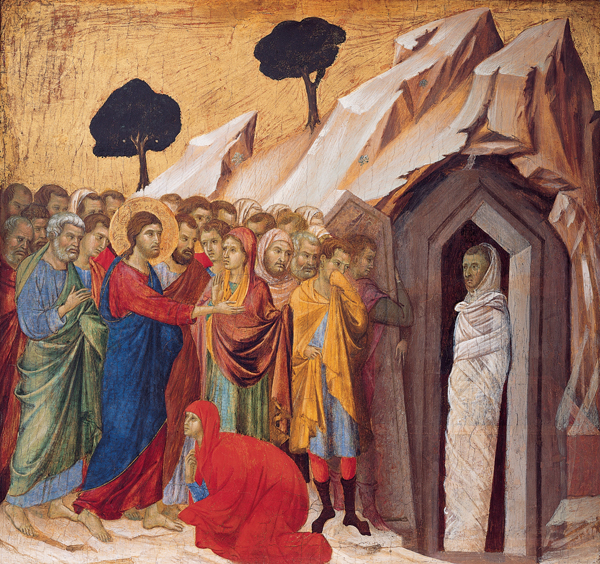Recently my five-year-old and four-year-old sons were having a discussion about how Jesus was born on Christmas and rose on Easter, and at one point they ask, “So what happened to Jesus on Halloween?” Today, the eve of All Saints begins the Church’s annual three-day reflection on death and the afterlife that will end on the feast of All Souls. On this occasion I wanted to change my son’s question around a bit and ask, “What happened to death because of Jesus?”
Physical death is the moment when our soul is separated from our body. This may seem like the natural end of things, a part of God’s design, but the opposite is the case. Death is evil, that is, death ought not be and wasn’t what God had intended. Human beings were not meant to die. Our souls were not meant to be separated from our bodies and our bodies were not meant to decay. The Catechism says, “Death is a consequence of sin…Even though man’s nature is mortal God had destined him not to die. Death was therefore contrary to the plans of God the Creator and entered the world as a consequence of sin” (CCC 1008).
The original sin of Adam is what brought death into the cosmos, it is where “death makes its entrance into human history” (CCC 400). And while you and I aren’t personally guilty of this first sin we still suffer the consequences of it because all of humanity is mysteriously united together and all of our sins are related to that original sin. As St. Paul says, “Through one person sin entered the world, and through sin, death, and thus death came to all, inasmuch as all sinned” (Romans 5:12).
But just as all of us are mysteriously united to the sin of Adam we are also all united to the resurrection of Jesus, “For just as through the disobedience of one person the many were made sinners, so through the obedience of one the many will be made righteous” (Romans 5:19). The Catechism says that “Death is transformed by Christ” (CCC 1009). Notice that the Catechism doesn’t say that Jesus corrected or undid death. No, he transformed it. “The obedience of Jesus has transformed the curse of death into a blessing” (CCC 1009). For “where sin increased, grace abounded all the more” (Romans 5:20).
Through our baptism, we participated in the death of Christ. Through baptism, God transforms us into “other Christs” (CCC 2782). Heaven isn’t some abstract “being with God.” Rather, heaven is fully participating in God’s divine nature, “For the Son of God became man so that we might become God” (CCC 460). Heaven isn’t some place we go after we die but rather the completion of our transformation into God, a process of transformation that began at Baptism.
Jesus took death, this evil consequence of our sin, and transformed it into the gateway to eternal life. Because of Christ, we are able to pray like St. Francis, “Praised are you, my Lord, for our sister bodily Death.” Or like St. Paul, “Death is swallowed up in victory. Where, O death, is your victory? Where, O death, is your sting?” (1 Corinthians 15:54-55).
So on this eve of All Saints Day, I invite you to reflect on the reality of death. What is Jesus trying to tell us as we face our own death or the death of loved ones? What does our Father want to say to us in the face of the profound fear and sorrow surrounding death? When her brother died, our Lord said to Martha, “I am the resurrection and the life; whoever believes in me, even if he dies, will live, and everyone who lives and believes in me will never die. Do you believe this?”
Jesus, give us the faith to believe.

Paul Fahey is a husband, father, and a parish director of religious education. He can be found at his website, Rejoice and be Glad: Catholicism in the Pope Francis Generation.
